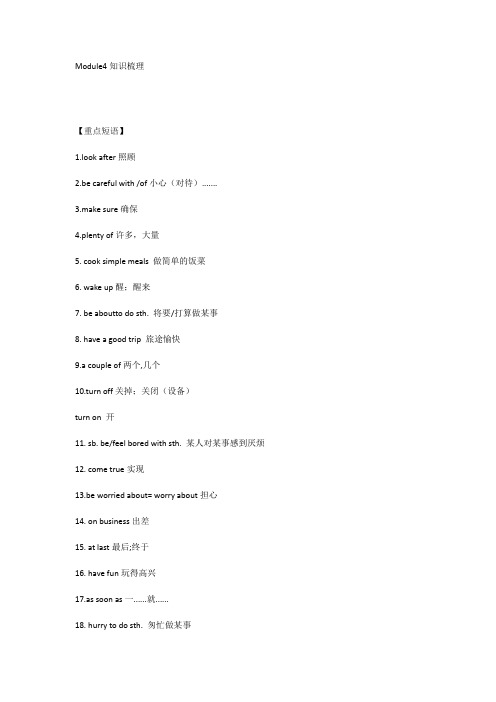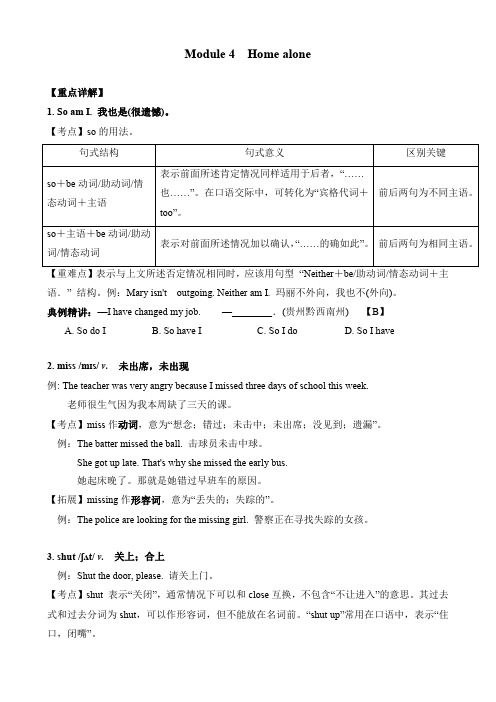外研版初三英语九年级上册Module4知识点
- 格式:doc
- 大小:29.50 KB
- 文档页数:2

Module4知识梳理【重点短语】1.look after照顾2.be careful with /of小心(对待).......3.make sure确保4.plenty of许多,大量5. cook simple meals 做简单的饭菜6. wake up醒;醒来7. be aboutto do sth. 将要/打算做某事8. have a good trip 旅途愉快9.a couple of两个,几个10.turn off关掉;关闭(设备)turn on 开11. sb. be/feel bored with sth. 某人对某事感到厌烦12. come true实现13.be worried about= worry about担心14. on business出差15. at last最后;终于16. have fun玩得高兴17.as soon as一......就......18. hurry to do sth. 匆忙做某事19. ask sb. for sth.向某人要某物20. hand in上交18. be unable to do sth.不能做某事19. feel tired and sleepy 感到又累又困20. help sb. with sth. =help sb. (to) do sth.21. tidy up收拾;整理22. Plan to do sth. 计划/打算做某事22. depend on依靠;依赖;取决于23. say goodbye to sb.和某人道别24. see sb.off送别某人25. be busy doing sth.be busy with sth.26. be /get readyfor sth. 为某事准备好be/get ready to do sth. 准备好做某事27. get sth.ready 把某物准备好We must get dinner ready. The guests are coming. 28. in a hurry 匆忙hurry up 赶快29. by accident= by chance 意外地,偶然地30. later on以后,后来31. take away 拿走,带走32. in danger 处于危险中33. all day long整天34. point out 指出35. call the police 报警36. clean up清理37. fight with 与……打架【用法集萃】1. so+be动词/助动词/情态动词+主语........也是如此2. so+形容词/副词+that从句如此......以至于3. lots of+可数名词复数/不可数名词许多......4. advise sb. to do sth.建议某人做某事5. be about to do sth.即将做某事6.want to do sth.想要做某事7. a bit+形容词/副词有点.....8. have to do sth.不得不做某事9. a few+可数名词复数几个......10.be unable to do sth.不能做某事11. try to do sth.设法做某事12. want sb to do sth.想让某人做某事13. start to do sth.开始做某事14. be happy to do sth.做某事很高兴15. tall sb. to do sth.告诉某人做某事16. learn to do sth.学会做某事17. be busy doing sth.忙于做某事【话题写作】1、今天是6月21日,父亲节。

Module 4 Home alone【重点详解】1. So am I. 我也是(很遗憾)。
【考点】so的用法。
语.”结构。
例:Mary isn't outgoing. Neither am I. 玛丽不外向,我也不(外向)。
典例精讲:—I have changed my job. —________.(贵州黔西南州) 【B】A. So do IB. So have IC. So I doD. So I have2. miss /mɪs/ v.未出席,未出现例: The teacher was very angry because I missed three days of school this week.老师很生气因为我本周缺了三天的课。
【考点】miss作动词,意为“想念;错过;未击中;未出席;没见到;遗漏”。
例:The batter missed the ball. 击球员未击中球。
She got up late. That's why she missed the early bus.她起床晚了。
那就是她错过早班车的原因。
【拓展】missing作形容词,意为“丢失的;失踪的”。
例:The police are looking for the missing girl. 警察正在寻找失踪的女孩。
3. shut /ʃʌt/ v.关上;合上例:Shut the door, please. 请关上门。
【考点】shut 表示“关闭”,通常情况下可以和close互换,不包含“不让进入”的意思。
其过去式和过去分词为shut,可以作形容词,但不能放在名词前。
“shut up”常用在口语中,表示“住口,闭嘴”。
例:He shut his eyes. 他闭上了眼睛。
Mike was shut in the bedroom. 迈克被关在卧室里。
4. anybody /'eniˌbɒdi/ pron.任何人例:Anybody can understand this story. 任何人都能理解这个故事。


初三英语上册(外研版)Module 4 Home alone知识点总结一、重点词汇·原文再现It’s leaving from Platform 2.它将在2号站台出发。
·基本用法1. platform n. 月台;站台。
如:Any train from this platform stops at Gatwick.从这一月台开出的火车都在盖特维克停。
2. platform n. 讲台。
如:Jane walked boldly up to the platform without faltering.简沉着大胆地走上讲台。
·原文再现The meeting in Lhasa is very important for us…在拉萨的会议对我们而言很重要……·基本用法meeting n. 会议;集会,at meeting意为“在会议上”。
如:Our meeting in Beijing was later than I expected.我们在北京的会面比我们预想的要晚。
I’m sorry Mr. Wang is at meeting now.很抱歉王先生正在开会。
have/hold a meeting 意为:开会The manager is having a meeting.经理正在开会。
·知识拓展--相关单词meet v. 遇见;满足(过去式:met 过去分词:met 现在分词:meeting 第三人称单数:meets)meet with. “遇到;碰到”强调偶然性;还常表示“遭遇;经历;遭到”。
I met with a childhood friend on the bus.我在汽车上遇到一个儿时的朋友。
They met with an accident on their way back.他们在回去的路上遇到车祸。
·原文再现Shut it when you’re in and l ock it when you go out.当你在家时要关好门,当你外出时要锁好门。


外研版九年级上册module4知识点Module 4: A lesson in a labIntroduction:In Module 4 of the Foreign Language Press Grade 9 textbook, students are introduced to the fascinating world of scientific experiments. This module provides a practical approach to learning through hands-on experience in a laboratory setting. By engaging in various experiments, students not only develop their scientific understanding but also enhance their critical thinking and problem-solving skills. Let us delve into the key points covered in this module.1. The Scientific Method:The module begins by familiarizing students with the scientific method, a systematic approach used by scientists to investigate natural phenomena. The scientific method consists of several steps, including observation, hypothesis formulation, experiment design, data collection, analysis, and conclusion. Understanding the scientific method enables students to approach problems in a logical and structured manner, emphasizing the importance of evidence-based reasoning.2. Laboratory Safety:Prior to conducting any experiments, it is crucial for students to be aware of laboratory safety protocols. This ensures not only their own well-being but also the integrity of the experiments. Students learn about the importance of wearing safety goggles, lab coats, and gloves to protect themselves from potential hazards. In addition, they are taught how to handle chemicals safely, dispose of waste properly, and clean up spills promptly. These precautions instill a sense of responsibility and caution when working in a lab environment.3. Variables and Controls:Next, students explore the concepts of variables and controls. Variables are factors that can influence the outcome of an experiment, while controls are used as reference points to compare results. Students learn to identify and manipulate independent, dependent, and controlled variables in order to design experiments that yield reliable and valid data. This understanding allows them to critically analyze experimental results and draw meaningful conclusions.4. Data Analysis and Presentation:An essential part of the scientific process involves analyzing and interpreting data. Students acquire skills in organizing and presenting data using various forms such as tables, graphs, and diagrams. They learn how to identify trends, patterns, and relationships within the data, enabling them to draw meaningful conclusions. Furthermore, students are encouraged to think critically about their findings and evaluate their reliability, considering potential limitations or sources of error.5. Collaboration and Communication:Science is a collaborative field, and effective communication plays a vital role in the exchange of ideas and discoveries. In module 4, students engage in group work, conducting experiments and sharing their findings with peers. Through this collaborative experience, students learn to articulate their thoughts clearly, pose relevant questions, and provide constructive feedback. Effective communication skills not only strengthen scientific knowledge but also foster teamwork and cooperation.Conclusion:Module 4 of the Foreign Language Press Grade 9 textbook offers an engaging and enriching experience in the realm of scientific experiments. By delving into the scientific method, laboratory safety, variables and controls, data analysis and presentation, as well as collaboration and communication, students develop a well-rounded scientific mindset. Equipped with these essential skills, students are better prepared to navigate the exciting world of science and contribute to the ever-evolving field of knowledge.。
外研版九年级上册Module4知识点一:如今停止时表示未来:当表示方案好或预备要做某事时,可用如今停止时表示未来例:Jim is going boating this afternoon。
吉姆明天下午要去划船Are they all coming tomorrow?他们明天都要来吗?例:Dad ______the USA in two weeks .A, is leave for B, leaves for C, is leaving for D, left for二,so 引导的倒装句So+be动词/助动词/神态动词+主语:表示前面所说的状况也适用于另一团体或物be动词/助动词/神态动词,要和前一句的谓语动词坚持分歧。
此处的so 和副词〝这样,这么〞及连词〝因此,所以〞不同,在这个句型中,so 常用来替代上文中的描画词,名词,或动名词,表示赞同。
例:She is an English teacher .So am I .He can swim ,and so can I.例:Sandy likes English best .She reads the texts every day .A, So does Jim B, So Jim does C, So Jim is D, So is Jim三:so +主语+谓语和so +谓语+主语的区别:当两个句子指的是两团体时,so 后句子用倒装例:He is a student .So am I .他是一个先生。
我也是。
当两个句子指的是同一团体时,so 后句子不倒装。
例:Lucy likes dark blue . So she does .路西喜欢深蓝色。
确实如此。
例:______exciting news it is ! Disneyland in Shanghai has opened to the public!_______.We plan to go there this summer holiday.A, What an ; So is it . B, What ;So it is . C, How ;So it is . D, How; So is it .四,as 和like 作介词的用法As 用作介词,〝作为,当作〞例:I found a job as a guide .Like 用作介词,like 前边普通要有be 动词,翻译为〝像。
Module 4 Unit 11. look after照顾= take care oflook after well = take good care of2. train number 车次3. be leaving 现在进行时表将来(类似come, start , go 等)4. Platform Two 二站台(注意首字母大写)5. be important for sb 对某人很重要It’s important for sb to do sth对于某人来说做某事很重要6. ① So + be / 助动词/ 情态动词+ 主语.... 也是(前文为肯定情况)--- I like apples. ---- So does Tony. Tony 也喜欢苹果。
②So + 主语+ be / 助动词/ 情态动词的确如此(同意上述观点)--- I like apples. --- So you do. 你确实喜欢苹果。
③ Neither / Nor + be / 助动词/ 情态动词+ 主语.... 也不(前文为否定情况)--- I don’t like bananas. --- Neither / Nor does Tony. Tony 也不喜欢香蕉。
7. miss two weeks of school 缺席两周的课8. Will you remember everything (that) I’ve told you? 你能记得我告诉过你的所有事情吗?划线部分为定语从句,修饰everything。
其中定语从句省略了关系代词that9 .be careful with /of小心(对待).......10. make sure确保11. plenty of + 可数名词/ 不可数名词许多,大量12. cook simple meals 做简单的饭菜13. wake up醒;醒来(动副短语)14. There won’t be anybody to wake you up in the morning. 早晨没有人会叫你起床。
Module 4【重点单词】1.platform [ˈplætfɔ:m] n. (供上下火车用的)月台,站台2.meeting [ˈmi:tɪŋ] n. 会议,集会3.miss [mɪs] v. 未出席,未出现4.shut (shut, shut) [ʃʌt] v. 关上,合上5.lock [lɒk] v. 锁,锁住6.simple [ˈsɪmpl] adj. 简单的,容易的7.anybody [ˈenibɒdi] pron. 任何人8.clock [klɒk] n. 钟,时钟9.ring (rang, rung) [rɪŋ] v. 鸣响,发出铃声10.passenger [ˈpæsɪndʒə] n. 乘客,旅客11.address [əˈdres] n. 地址12.text [tekst] n. 文本,正文13.couple [ˈkʌpl] n. 一对,两个14.actually [ˈæktʃuəli] adv. 事实上15.manage [ˈmænɪdʒ] v. 管理,支配16.unhappy [ʌnˈhæpi] adj. 不高兴的17.order [ˈɔ:də] n. 命令,指示18.business [ˈbɪznəs] n. 工作19.sofa [ˈsəʊfə] n. (长)沙发20.snack [snæk] n. 点心,小吃21.midnight [ˈmɪdnaɪt] n. 午夜,子夜22.empty [ˈempti] adj. 空的23.unable [ʌnˈeɪbl] adj. 不能做某事的24.burn (burned/burnt, burned/burnt) [bɜ:n] v. (使)烧焦,(使)烤糊25.cup [kʌp] n. 杯子,一杯饮料26.task [tɑ:sk] n. 任务,工作【重点短语】1.look after 照顾;照看2. make sure 确信;确保3. plenty of 很多;大量的4. wake up醒来5. so... that... 如此……以至于……6. advise sb. to do sth. 建议某人做某事7. be about to将要,正打算;即将;就要8. send sb. sth./send sth. to sb. 送给某人某物9. at a meeting 在会议上10. a bit unhappy有点儿不开心e true 实现12.on business 出差13.hand in上交14.tidy up整理,收拾15. be able to能够……16. be busy doing... 忙于做……17. get ready准备好18. fight with用(某种武器)与(某人)交战;用(某种方式、手段)反对(某人)19. be in a hurry立刻20. later on以后;后来21. in danger在危险中22. point out 指出;指明23. be worried about 担心【重点句型】1. I can look after myself, although it won’t be easy for me.虽然对我来说并不容易,但我能照顾我自己。
Module 4 Home alone重要知识点讲解Unit 1一、重点短语be careful with 小心(对待);注意look after 照顾;照看make sure 确保;设法保证plenty of 许多;大量;充分的wake up 叫醒;喊醒;使...醒来advise sb to do sth.建议某人做某事be about to do sth.即将做某事send sb a text message 给某人发短信have a good trip 旅途愉快a couple of 两个;少数几个二、So am I[点拨](1)英语中在表示“某人/物和……一样”时(表肯定),常用“so+情态动词/助动词/系动词+另一个主语”,常翻译为“……也……”或“……也是”,主语不是同一人或物。
Tom is a student, so is Lingling.汤姆是一名学生,玲玲也是。
(2)表示“某人/物一样不……”时(表否定),常用“neither/nor+情态动词/助动词/系动词+另一个主语”,常翻译为“……也不……”或“……也不”,主语不是同一人或物。
Sally can't play the violin, neither/nor can I.萨利不会拉小提琴,我也不会。
(3)“so+主语+助动词/情态动词/系动词”则表示“……确实是这样”,主语是同一个人或物。
--Tom was late this morning. ---So he was. ——汤姆今天早上迟到了。
——他确实迟到了。
三、so ... that “如此……以至于”[点拨]“so+形容词或副词+that ...”引导结果状语从句。
The boy is so young that he can't look after himself.这个小男孩太小了以至于他无法照顾好自己。
He was so late that he missed the early train. 他如此的迟以至于错过了早车。
外研版初三英语九年级上册Module 4知识点
Module 4
一、重点短语
1. 叫醒wake up
2. 关掉turn off
3. 担心be worried about
4. 出差on business
5. 整天all day long
6. 依靠depend on
7. 厌烦be bored with
8. 照顾look after
9. 许多plenty of
10. 两个a couple of
11. 注意be careful with
12. 整理tidy up
13. 不善于bad at
14. 玩得开心have fun
15. 请求ask...for...
二、重点句型
1. so...that... 如此……以至于……
2. be about to... 即将……
3. I am sure that... 我确定……
4. unable to do... 不能做
三、重点语法
so...that...意为“如此……以至于……”,so 后接形容词或副词的原级,表示程度,that 引导的是结果状语从句,例如:
He has so many friends here that he doesn’t feel lonely at all.
在这儿他有很多朋友以至于他一点也不感到孤独。
although / though 作连词,意为“虽然;尽管;然而”,引导让步状语从句,例如:I exercised for half an hour though I was a little bit tired today.
尽管我今天有点累,我还是锻炼了半个小时。
Although / though 引导让步状语从句时,不能与but 同时使用,但可以与yet, still 连用。
记课堂笔记的小技巧
1、不要记得太紧太密,每页右边留下约1/3的空白处,以便日后补充、修改。
2、用词用语要简洁浓缩,常用词语可用代号。
3、写字要快、字迹不必要求太高,看清就行。
4、注意听课与看书结合,有些内容可直接在书上批注。
5、采用简单的便利贴随时准备记录灵感问题,整理成型后及时补充到笔记本上。
对于一些经常犯错的知识点,可以直接把总结写在便利贴上,补充到对应的知识点旁边。
6、利用活页:活页既适合于语文和文综积累型科目,不断补充新知,把笔记变厚;也适合于数学、理综这样的思维型科目,蹦出的新思路、相似的题型、自己的痛点和解题的突破口再也不必拘泥于原有的纸张限制。